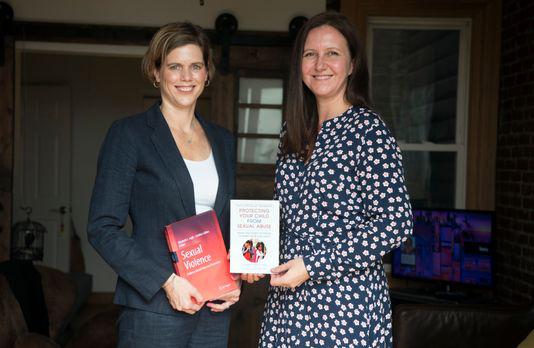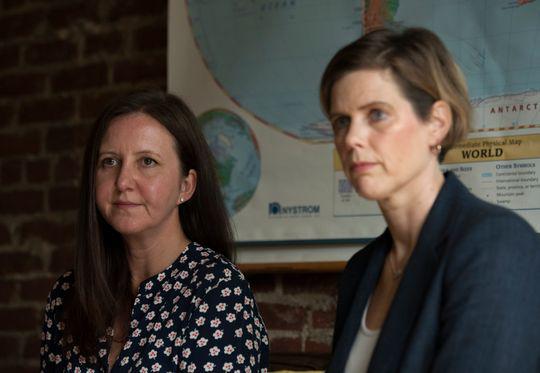|
How parents can help protect their children from sexual abuse
By Hannan Adely
[with video] From #metoo, to sex crimes against young gymnasts, to Catholic Church abuse scandals, stories about sexual violence have gripped this nation. In fact, the Centers for Disease Control and Prevention estimates that one in four girls and one in six boys are sexually abused before the age of 18. It’s a frightening statistic, but parents don’t have to feel helpless. There are concrete steps parents can take today to prevent sexual violence, said Elizabeth L. Jeglic and Cynthia Calkins, clinical psychologists who published a book on the topic earlier this year. “Knowledge is power,” said Calkins. “There are lot of misconceptions about sexual abuse and sexual violence, so we wanted parents to be informed about what that abuse looks like, who perpetuates it, where it happens and what the circumstances around abuse are.” As professors at the John Jay College of Criminal Justice, Jeglic and Calkins have researched sexual violence for more than a decade. Together, they’ve published articles in academic journals, written a book and spoken to peers at conferences about their findings on sexual violence prevention. But after becoming mothers, they decided to take what they had learned and make it readable and useful for the public. Their book, “Protecting Your Child from Sexual Abuse: What You Need to Know,” lays out skills and tips that can help parents protect their children and educate themselves on the facts and myths surround the topic of sexual abuse. In an interview with NorthJersey.com and the USA Today Network New Jersey, Calkins and Jeglic offered tips for families and explained why conversations about sexuality should start early – as young as toddlerhood. Sexual abuse prevention tipsCalkins and Jeglic identified a central theme in their book: openness and ongoing dialogue that should start at an early age. Children need to know how to express themselves, learn about consent and feel comfortable talking to a parent about problems that arise as they grow older and face risks or harm. That kind of dialogue, they said, is critical to breaking the epidemic of abuse that Americans are hearing about so frequently in the news. “It wasn’t long ago when there was so much shame and secrecy around this topic, that people didn’t talk about it,” said Calkins, a Union City resident with two sons, ages 2 and 5. “If there was abuse or things were going on, that was shoved under the rug by institutions, by parents and by people who were charged with the protection of children.” In their conversations, parents should be mindful of how they themselves talk about sexuality and body parts, said Jeglic, a Cranbury mother of three children aged 10, 7 and 5. “Saying ‘You don’t talk about those areas of your body’ or ‘I don’t want to hear about that,’ conveys to the child this is something they can’t share if they believe it’s shameful. So be open about this topic,” she said. Discussing sexual abuse doesn’t have to be a “Hollywood moment” where a parent sits with a child in their room to have a serious talk, said Calkins. Rather, conversations should be ongoing and can happen at home, riding in cars, during walks, or anywhere regular conversations take place. Here are more tips from the authors: Teach anatomical terms. As young as toddlers, teach children to use correct anatomical terms. Children who are informed about their bodies can more accurately describe what is happening to them should a problem arise. Teach consent. Teach children that they are in charge of their bodies and who can touch them. Respect their decision to say no to tickles, hugs and kisses. As they age, talk to them about consent in relationships. Discuss hypothetical situations or situations from the news and discuss with them what they would do. Offer support. Make sure they understand that as a parent, you are always there to help them, support them and listen to them. Believe them. If a child tells you about abuse, take it seriously, make sure the child is safe and get the person who may be causing harm out of the child's path and the path of other potential victims. Monitor online activity. Let children know that you will be checking their online activity. Don’t allow them to keep electronic devises in their rooms at night. Know limits of sex offender registries. Convicted sex offenders are not the primary threat. Rates of recidivism – or rates of repeat offense – are around 13 or 14 percent. Nearly 96 percent of new sex offense convictions are committed by someone not on a sex offender registry. “We don't necessarily have to be so worried about sending kids to park by themselves, but more who are we leaving our children with when they're not being supervised,” Jeglic said. Know where abuse occurs and by whom. Most abuse happens in private settings, like a home or a friend’s home. Perpetrators can be male or female adults or older children. Victims can be female or male. In 93 percent of cases, children are abused by somebody they know, such as a family member, friend or community figure. "We as parents have to know that, but also let our children know that even if it’s a person of authority, mommy and daddy are going to listen and take that seriously,” Jeglic said. Watch out for red flags. Adults who ask children to keep secrets or who buy presents and treats for kids could be “grooming,” or setting the stage for abuse to occur. Children should feel free to talk about any adult who makes them feel uncomfortable. “If they’re talking to you about sexual matters or touching you in a way you don’t feel comfortable with or getting too close to you, you need to share that information” with a trusted adult, Jeglic said. Changing cultureThe authors said current policies and laws, which have been based on popular misconceptions, are failing to stop sexual abuse. The focus must be on society, they said — changing people's attitudes and preventing abuse from happening in the first place. The numerous sex abuse scandals exposed in recent years may seem overwhelming or troubling, but the fact that these discussions are happening at all is a good thing, the authors said. “A generation ago, people felt very differently about the likelihood of abuse in the Church or the people in power who might be able to do this,” said Calkins. “Now we see institutions like the Catholic Church or Boy Scouts or Gymnastics Association” identified in abuse cases. “There’s a cultural shift in understanding where or how abuse can occur and by whom,” she added. “That in my opinion has probably led the way or opened the door for the #metoo movement and this national dialogue we're having.” It's not easy to speak publicly about abuse. In some case, victims who speak out or press charges are not believed, or the perpetrators are never brought justice. Despite this, it’s important to talk about abuse, the authors said. Accountability is greater today, and just speaking out can create a trail of evidence against a perpetrator. When there’s reporting and a semblance of accountability, the hope is that the perpetrators will be more afraid, Jeglic said. “I think we’re on the precipice of change and we’re trying to figure it all out,” said Jeglic. “The important thing is we are talking about it and taking it out of this place of shame to a national discussion.”
|
.
Any original material on these pages is copyright © BishopAccountability.org 2004. Reproduce freely with attribution.

